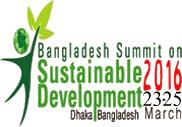During the summit, through twelve plenary sessions, thirty-six breakout sessions, and twelve poster sessions, twelve specific thematic areas will be addressed. In addition, there will be inauguration and closing sessions along with cultural events followed by a gala dinner.
- Universal access to water and sanitation
- Access to safe drinking water and sanitation
- Proper integrated water resource management
- Sustainable agriculture and food security
- Ensure sustainable food production systems
- Nutritious diets with low food losses and waste
- Halt forest and wetland conversion to agriculture, protect soil resources
- Quality education and lifelong learning
- Access to quality early childhood development programs and policies
- Quality primary and secondary education for all girls and boys
- Youth transition effectively into the labor market.
- Sustainable management of natural resources
- Development through access to energy, energy efficiency and renewable energy sources
- Sustainable management and use of natural resources
- Securing the life chances of local communities and indigenous peoples
- Healthy life and access to health services
- Universal coverage of quality healthcare
- Prevention and treatment of communicable
- Prevention and treatment of non-communicable diseases
- Access to primary health care and services
- Prevention of child and maternal mortality
- Sustainable livelihoods and equitable growth
- Sustainable income level and secured workplace
- Enabling business environment and boosting entrepreneurship
- Strengthen production capacity and structure
- Gender equality and women empowerment
- Eliminate discrimination and inequalities in public service delivery, the rule of law, access to justice
- Establish equal rights on the basis of gender, ethnicity, religion and disability
- Prevent and eliminate violence against women and children
- Sustainable land and ecosystem management
- Secured ecosystem
- Protection of ecosystem services and environmental harms
- Sustainable management of water, agricultural land, forests, fisheries and mining
- Democratic governance and effective institutions
- Creation of resilient and inclusive democratic institutions based on laws
- Effective governance system
- Monitoring the institutions for proper governance
- Sustainable energy and green technology
- Capacity building through transferring technologies
- Accelerate adoption of new technologies for the SDGs
- Climate change and disaster risk management
- Decarbonize the energy system, ensure clean energy for all and improve energy efficiency
- Ensuring farming systems resilient to climate change and disasters
- Ensure safe air and water quality for all, and integrate reductions in greenhouse gas emissions and efficient land and resource use
- Sustainable urbanization and resilient cities.
- End extreme urban poverty, expand employment and productivity
- Raise living standards, especially in slums
- Ensure universal access to basic urban services (housing; water, sanitation and waste management; low-carbon energy and transport; and mobile and broadband communication)
